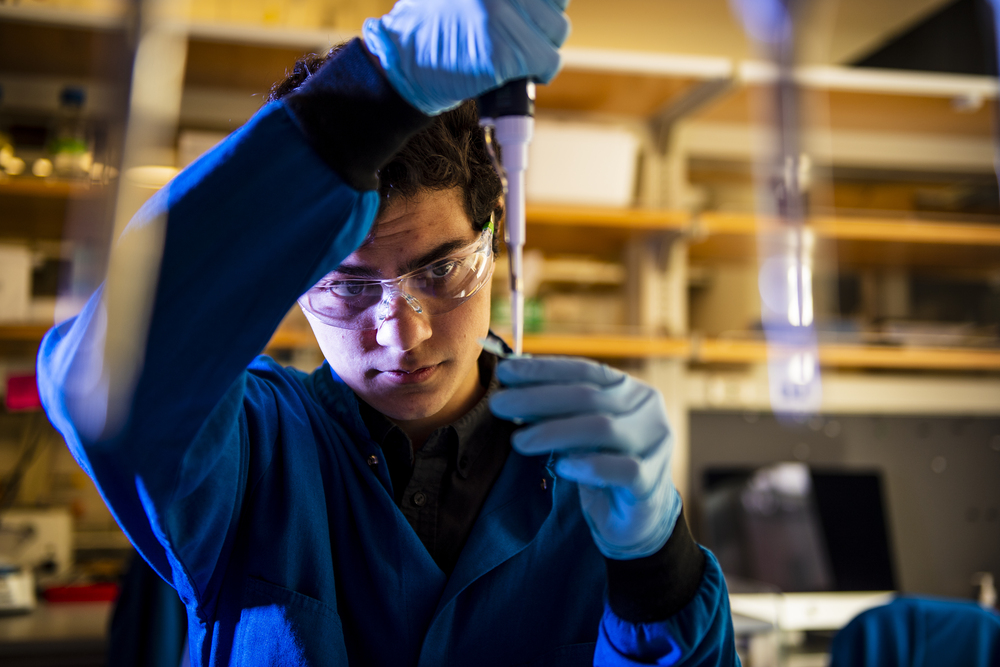Breast Cancer Awareness Month, observed every October, aims to support individuals affected by breast cancer, enhance understanding of risk factors, encourage regular screening, and fundraise for research.
According to the National Breast Cancer Foundation, 1 in 8 women in the United States will be diagnosed with breast cancer in their lifetime. Despite there being 3.8 million survivors in the U.S., an estimated 43,700 women will die from the condition in 2023. For one Northeastern student, these statistics were impossible to ignore.
Dillon Nishigaya is a third-year biology student who, in his first semester at N.U.in Greece, served as an undergraduate research assistant to Andreas Anestis at the American College of Thessaloniki. Nishigaya’s role involved contributing to a research paper that explored the potential link between breast cancer and food additives, a subject of investigation by Anestis and his team.
“Many factors contribute to breast cancer, such as genetic mutations, aging, smoking, poor diet … and thousands end up dying from it every year,” Nishigaya continued, citing the previously mentioned statistics and stating, “with breast cancer, the rates have only risen. This is something that needs to be examined.”
In the context of Nishigaya and Anestis’ research, food additives were considered as a possible risk factor for breast cancer. According to the World Health Organization (WHO), “food additives are substances that are added to food to maintain or improve the safety, freshness, taste, texture, or appearance of food.” In addition, WHO states that there are several thousand food additives used worldwide. Nishigaya elaborates on this, citing a statistic from a 2016 study from the University of Missouri, that found a U.S. citizen consumes about nine pounds of chemical additives a year.
“Essentially, there is a potentially high likelihood that food additives and preservatives are increasing your chance of developing breast cancer down the line … one of the main hypotheses is that what you are putting into your body can increase the likelihood of getting cancer overall,” Nishigaya says.
This hypothesis is signicant to Breast Cancer Awareness Month’s goal of spreading awareness about the risk factors associated with developing breast cancer. However, food additives are not well understood by the general public, especially as a potential risk factor for cancer.
“Not many are eating food and know exactly what it’s been through, what’s in it, if it was inspected properly, etc … you would want to know, especially before putting something in your body, that it may increase the likelihood of developing a life-threatening disease,” Nishigaya explained.
However, most Americans are unable to buy organic or additive-free foods. According to a 2016 study by the Pew Research Center, 6% of Americans eat only organic foods, and 79% of Americans who did not buy organic foods cited cost as the primary reason. Nishigaya acknowledges this disparity and says that if individuals simply know the risk of what they are consuming in terms of developing breast cancer, it could make for a promising future.
Before this future can be realized, Nishigaya highlights the need for continued research, another goal of Breast Cancer Awareness Month.
“It is imperative that scientists research and study how dangerous food additives and preservatives can be. [This research] has the opportunity to change the lives of individuals and their families all over the world,” Nishigaya continues, “the increase in food additives and the subsequent rise in breast cancer cases is impossible to ignore.”
“A lot of people might be completely unaware that they’re increasing their likelihood of potentially getting breast cancer down the road with their daily habits. One little adjustment or shift in certain additives … could have a major effect on reducing these rates … and potentially saving millions of people,” Nishigaya echoes.
In the spirit of Breast Cancer Awareness Month, Northeastern students are strongly encouraged to get involved with breast cancer research. Nishigaya, also the president and co-founder of the Undergraduate Research Club at Northeastern, offers advice to those seeking research involvement:
“Put yourself out there. I think there is so much opportunity for an individual if they’re passionate about it and willing to work hard … tell professors, other undergraduates, and employers … and once you end up getting an opportunity … know that research can be complicated, but extremely rewarding,” Nishigaya advises.
“Breast cancer research, even in the small capacity that I was involved in, got me extremely passionate about oncology research. It was incredibly interesting to learn about breast cancer and how many individuals are affected. Not only that, but how necessary research is to spread awareness, work on cures, and support the cause,” Nishigaya adds.
Throughout Breast Cancer Awareness Month and beyond, cancer research labs across campus are actively seeking the involvement of student researchers who hope to make a meaningful impact.
“With inspired researchers, I really think there will be possibilities of lowering statistics and improving breast cancer treatment.”

